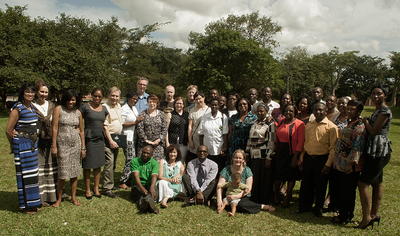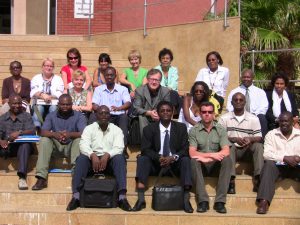
The Niilo Mäki Institute has extensive experience in building the capacity of the disabled services and education sectors in Africa. We have organized in-service training in neuropsychology and learning disabilities for professionals in the education sector, and developed the methods for assessing and supporting learning together with the partner countries’ experts. Honorary Doctor Onerva Mäki has acted as a pioneer in development cooperation projects and as the initiator of the training programs. Providing the latest scientific knowledge to our partners in Africa and supporting the development of special education curricula has been at the core of our development cooperation. In 2008, Onerva Mäki received the prestigious Amos Comenius Medal for her life’s work for the development of special education.
Niilo Mäki Institute’s first development cooperation projects in the early 1990s focused on training the instructors of African special education teachers in Clinical Child Neuropsychology Diploma Training (CCNP). The project’s first participants came from Kenya, Zambia, Namibia and Zimbabwe. A total of four diploma courses (each lasting one year) were organized. Most graduates now work as teachers and consultants or in state administration tasks.
The expertise of Niilo Mäki Institute was also utilized in the early stages of the Education Sector Support Program (ESSP), a bilateral program between Finland and Zambia supporting school management. Onerva Mäki acted as a consultant when developing the special education teacher training program. During ESSPIII, two test instruments were developed in Zambia: The Basic Skills Assessment Tool (BASAT) (Ketonen & Mulenga, 2002) for evaluating the reading and writing skills of the locals, and the Basic Numerical and Calculation Abilities tool (BANUCA) (Räsänen & Chilala, 2003) for assessing the numeracy of children in classes 1–3. These tests are used both at the University of Zambia’s Department of Educational Psychology, Sociology and Special Education and at the Zambia Institute of Special Education.

Later projects managed by the Institute have focused on further training of the instructors of special education teachers and on supporting the clinics for learning disorders in Zambia and Kenya. The clinic assess the children’s needs for special support and facilitate the studying of children with learning difficulties. The projects have been carried out with the state aid granted by Finnish Ministry for Foreign Affairs.
In the current project Niilo Mäki Instituete is developing and providing comprehensive free online PD programme (eTALE) on literacy learning and teaching for teachers, special education teachers, teacher trainers and trainees and voluntary mentors for illiterate women to improve the quality of teaching reading skills and avoid illiteracy. Teacher eLearning Africa project (eTaleAfrica) funded by Ministry for Foreign Affairs (2015-2016, 2019-2022). More information: http://www.taleafrica.com
